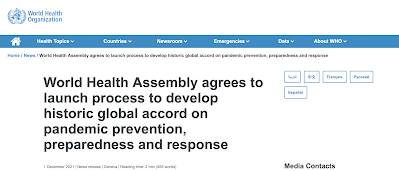
Back in December 2021 when everyone was distracted with the first appearance of the Omicron variant, yet another SARS-CoV-2 variant, the World Health Organization (aka the Bill Gates Health Organization) made an announcement regarding a decision that was made to protect the world from future infectious disease crises as announced here:
On December 1, 2021, the 194 members of the WHO’s World Health Assembly met in its second-ever Special Session (WHASS) where it adopted a sole decision entitled “The World Together” which established an intergovernmental negotiating body or INB to:
“…negotiate a WHO convention, agreement or or other international instrument on pandemic prevention, preparedness and response …“
The convention was initially proposed by Chile and the European Union in 2020.
This decision was made with a view to the adoption under Article 19 of the WHO Constitution, or other provisions of the Constitution as may be deemed appropriate by the INB what can best be described as a “pandemic treaty” which, on the surface, sounds delightfully proactive since the underlying logic is to correct the problems of global governance that failed during the COVID-19 pandemic.
As background, article 19 of the WHO Constitution provides the World Health Assembly with the authority to adopt conventions or agreements on any matter within WHO’s competence. The sole instrument established under Article 19 to date is the WHO Framework Convention on Tobacco Control, which has made a significant and rapid contribution to protecting people from tobacco since its entry into force in 2005.”
The INB held a second meeting on February 24, 2022 where two committee co-chairs reflecting a balance of developed and developing economies were elected along with four vice-chairs, one from each of WHO’s six regions. Here is a list of those elected:
Co-chair: Mr Roland Driece of the Netherlands
Co-Chair: Ms Precious Matsoso of South Africa
Vice-chair: Ambassador Tovar da Silva Nunes of Brazil
Vice-chair: Mr Ahmed Soliman of Egypt
Vice-chair: Dr Viroj Tangcharoensathien of Thailand
Vice-chair: Mr Kazuho Taguchi of Japan
The Method of Work for the establishment of a WHO pandemic treaty was also established in which the six chairs as noted above were to begin the development of a working draft for the treaty which is to be presented for consideration of the INB at its second meeting which is to be held no later that August 1, 2022. At this point, the INB will identify the provision of the WHO Constitution under which the instrument should be adopted.
The INB held an additional meeting (resumed session) on March 14 and 15, 2022 with the Bureau members proposing the following five ways to bring about a world that is better equipped to prevent and respond to future pandemics:
1.) building national, regional and global capacities based on a whole-of-government and whole-of-society approach;
2.) establishing global access and benefit sharing for all pathogens, and determining a global policy for the equitable production and distribution of countermeasures;
3.) establishing robust systems and tools for pandemic preparedness and response;
4.) establishing a long-term plan for sustainable financing to ensure support for global health threat management and response systems;
5.) empowering WHO to fulfil its mandate as the directing and coordinating authority on international health work, including for pandemic preparedness and response.
Here is a screen capture showing the recommendations by the INB’s chairs and co-chairs:
Note that under the fifth recommendation, the WHO will be the directing and coordinating authority on pandemic preparedness and response, a rather frightening prospect.
According to a 2022 paper entitled “The futility of the pandemic treaty: caught between globalism and statism” by Clare Wenham, Mark Eccleston-Turner and Maike Voss, the following are also part of the proposed issues that should be covered by the treaty:
“…access to medical equipment and countermeasures, including vaccines, diagnostics and treatments; capacity-building and standard-setting of health care systems; cooperation in research and technology; a ‘one health’ approach; data-sharing; reform of the WHO alarm mechanism, the public health emergency of international concern declaration process and travel restrictions; and cross-cutting issues, such as accountability, investment in health systems, increased power for the WHO and increased global coordination. Issues beyond the typical boundaries of health, such as trade and supply chains and international travel, have also been raised as potential substantive topics for the treaty to address. Finally, many member states framed the development of a treaty in terms of human rights, solidarity and equity, including redressing failures that have occurred during COVID-19.“
The authors also note that non-compliance has been a WHO problem for more than 50 years meaning that any treaty would have to use incentives or sanctions to ensure adherence to a pandemic treaty as quoted here:
1.) “Incentives could be designed to ensure that governments adhere to the pandemic treaty, whatever the content might be. For example, if a barrier to implementing effective surveillance systems is financing, a ‘carrot’ would be to ensure that funds are available to help with system-wide development. Similarly, if prompt reporting and sharing epidemiological data is seen as counterproductive to national (economic) security, financial or human resources could be made available upon the submission of such reports, mitigating the sting of any trade challenges.“
2.) “Sanctions for non-compliance are the alternative, yet these seem politically unsellable in the present climate. Moreover, sanctions may lead to greater concealment of outbreaks by states not wishing to be punished. Given the WHO’s current lack of enforcement power, coupled with a lack of financing, it appears that a pandemic treaty under the aegis of the WHO would merely maintain the status quo in compliance.”
The INB will be holding an additional resumed session between June 6 and 8, 2022. Here is a complete timeline and list of deliverables for the INB through to 2024:
Let’s close with this posting with a couple of points that we should be considering:
1.) Do we want a non-elected body (WHO) to be in charge of forcing governments to implement its agenda during the next pandemic? Since WHO seems very closely tied to China, what if WHO’s recommendation during the next pandemic is a “Shanghai-style lockdown” where people are basically locked into their homes, forced into internment camps and have their pets inhumanely disposed of by the state? Do we want WHO dictating policies that will have a significant impact on our economies given that their recommended response to the COVID-19 pandemic resulted in significant economic losses for individuals and states?
2.) Given this:
…and this, showing that the Bill & Melinda Gates Foundation is also a key donor to GAVI which itself is also a donor to WHO:
…and the fact that Bill Gates has never seen a vaccine that he didn’t like (a fact that has been proven time and time again during the current pandemic), do we really want to put our future into the hands of man who is best known as a purveyor of virus-prone software and who is profiting from the COVID-19 vaccines?
Unfortunately, the mainstream media has paid very little attention to the ongoing story behind what could turn out to be a very significant development in the global response to the next pandemic, one that would see an elected body of questionably qualified individuals dictating how our governments will respond to the next edition of a “COVID-xx” virus, resulting in nations completely relinquishing their sovereignty to an organ of the United Nations.
You can publish this article on your website as long as you provide a link back to this page.

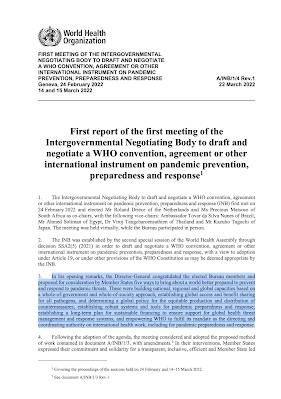
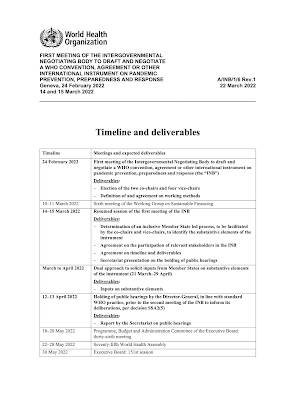
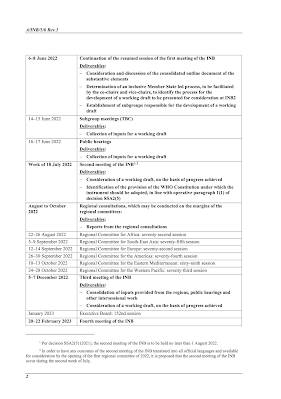
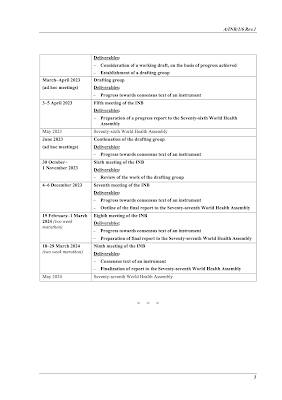
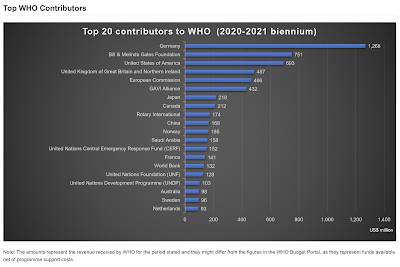
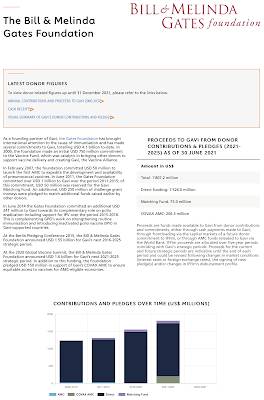
Be the first to comment